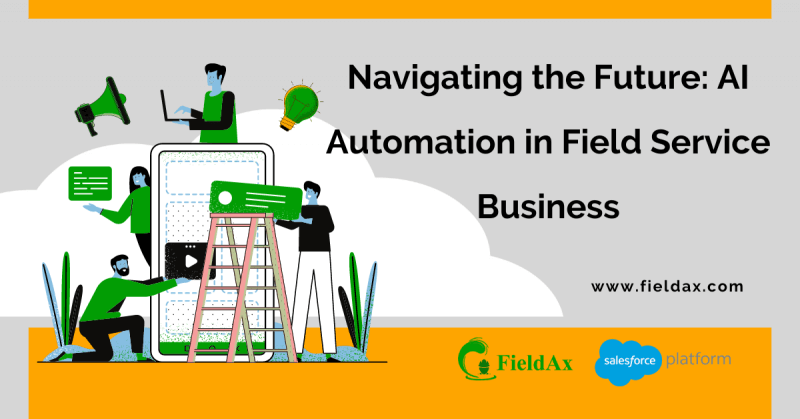Nearly half of organizations are utilizing AI with field service software to revolutionize their operations, with another 37% preparing to integrate these solutions into their business processes. AI-driven field service optimization is no longer a futuristic concept but a present-day reality, enhancing efficiency and elevating customer experiences across the sector.
Adopting AI can streamline complex field services, minimizing manual labor while delivering more effective outcomes for service teams and their clientele. This shift not only transforms field service businesses with automation but is also instrumental in contributing to a prospective $15 trillion boost to the global economy by 2030. The role of AI in field service improvement is profound, offering tangible benefits that trailblaze the path to a smarter, more connected future in service management.

The Role of AI in Streamlining Operations
- AI automates repetitive tasks and streamlines workflows, leading to optimized scheduling. This efficiency frees up technicians’ time, allowing them to focus on higher-value activities that require human expertise and problem-solving skills.
- By leveraging AI-powered tools, field service teams can collect and analyze relevant field data more efficiently. These tools help technicians make informed decisions, identify patterns, and gain valuable insights into field operations, ultimately enhancing operational efficiency.
- AI-driven systems revolutionize customer service by providing advanced customer portals with self-service options. These portals improve the customer experience by streamlining communication and offering 24/7 responses to routine inquiries, thus reducing wait times.
AI’s role in enhancing operational efficiency extends to several key areas:
- Optimizing Scheduling and Dispatching: AI algorithms consider factors such as technician skills, location, availability, and job complexity to streamline the scheduling and dispatching process.
- Predictive Maintenance: Utilizing predictive models, AI forecasts potential equipment failures, allowing for proactive maintenance that minimizes downtime.
- Improving Mobility: AI empowers technicians to access information about service jobs from anywhere, on any device, enhancing their ability to troubleshoot customer issues remotely.
- Safety and Compliance: AI-powered safety protocols ensure adherence to industry standards and regulations, safeguarding both technicians and customers.
- Customer Interaction: Tools like chatbots and virtual assistants automate simple queries and personalize the customer experience, ensuring consistent quality in customer interactions.
AI’s impact on field service management is transformative, enabling providers to adapt quickly to changing market conditions and customer demands. It not only increases productivity by reducing redundant work but also improves customer satisfaction through personalized interactions and real-time assistance. AI’s predictive capabilities and data analytics assist in creating a more efficient and effective maintenance practice, detecting patterns and correlations that lead to smarter service solutions.
By integrating AI into field service operations, businesses are not only improving their current service delivery but also setting the stage for a future where field service management is more agile, customer-focused, and efficient.

Boosting Operational Efficiency with AI Automation
- AI-driven route optimization is a game-changer in field service, significantly reducing time spent in transit. With intelligent scheduling, technicians are dispatched based on the most efficient routes, ensuring they arrive at job sites promptly and are well-prepared with the necessary tools and parts.
- The implementation of AI-powered self-service portals has been a boon for both customers and businesses alike. These portals empower customers to solve common issues independently, leading to higher satisfaction levels and a decrease in operational costs for the company.
- Predictive maintenance, powered by AI, is revolutionizing how businesses approach equipment upkeep. By analyzing data on equipment longevity and repair costs, AI helps prioritize maintenance tasks, minimizing downtime and optimizing resource allocation.
AI is not just about automation; it’s about enhancing the human aspect of field service. The technology equips technicians with mobile apps that provide all the job details they need right at the job site, streamlining work order management and execution. This access to information anywhere, on any device, ensures that field technicians can offer virtual and remote services, expanding the possibilities of field service delivery.
Furthermore, AI-powered field service assistants are invaluable in collecting and analyzing data. They enable technicians to make informed decisions, recognize patterns, and gain insights that lead to more efficient and effective operations. These assistants also automate repetitive tasks, schedule proactive equipment maintenance, and help to minimize downtime, ensuring that the field service workflow is as lean as possible.
In summary, AI automation in field service is about:
- Predictive Work Duration: Using historical data to give accurate estimates on job times, enhancing scheduling accuracy and customer satisfaction.
- Streamlined Work Order Management: Bringing important information to the forefront for easy management and reducing unnecessary steps in the process.
- Integration with Key Applications: Seamlessly connecting field service operations with essential Microsoft 365 applications to keep all necessary tools accessible.
By embracing AI, field service businesses are not only optimizing their current operations but are also paving the way for a future where service management is more agile, more customer-centric, and more efficient. The key is to align AI’s potential with the company’s objectives, identify KPIs for improvement, and ensure that the data collected is accurate and consistent with AI requirements. With these measures in place, businesses can reduce operational costs, increase profitability, and deliver a customer experience that stands out from the competition.
Overcoming Implementation Challenges for AI in Field Service
- Building trust with AI systems is crucial, as there is often skepticism about relying on machines for key tasks like customer service. To address this, companies should focus on transparency, showcasing how AI decisions are made and ensuring they are explainable to end-users.
- Integrating AI with existing processes requires careful planning. Companies must choose the right tools for data collection and analysis and determine the types of data that are most relevant for their AI systems to process.
- To combat ethical concerns and biases, it is essential to use diverse and representative data sets during AI training. Involvement of a varied group of individuals in the development process can also help mitigate potential discrimination.
- Upskilling the workforce is necessary to enable employees to work effectively alongside AI. Training programs should focus on teaching staff to manage and interact with AI systems rather than just performing manual tasks.
- Ensuring high-quality data is fundamental for AI models. This involves understanding and applying data preprocessing, cleaning, and validation techniques to maintain data integrity.
- When selecting AI models, it’s important to have expertise in choosing the right one and fine-tuning it for optimal performance. In many cases, this may require seeking external expertise or investing in employee training.
- Integration challenges can be overcome by ensuring compatibility with existing systems, managing data flow effectively, and ensuring a seamless transition with specialized system integration knowledge.
- Staying current with ethical and regulatory compliance is vital. Professionals should be educated on ethical implications and the evolving regulatory landscape surrounding AI.
- Continuous learning is key in the fast-paced AI field. Employees should be encouraged to stay updated with new technologies and best practices, fostering an environment of ongoing education and adaptation.
- To ensure successful AI implementation, it’s essential to start with clear objectives that align with business goals. This includes setting aims for AI initiatives that are specific and measurable.
- Investing in AI talent and training is non-negotiable. Whether by hiring new experts or training existing staff, continuous learning programs are necessary to keep up with AI advancements.
- Data preparation is a cornerstone of AI success. High-quality, reliable data must be collected, cleaned, validated, and protected to feed into AI models effectively.
- Choosing the right technology is crucial. AI tools should be selected based on the organization’s scalability and integration needs, and custom AI solutions should be developed for unique requirements.
- Ethical guidelines for AI use should be established, and stakeholder involvement in AI development should be prioritized to ensure a holistic approach.
- Starting small with AI projects can lead to greater success. By securing leadership and employee buy-in, investing in necessary infrastructure, partnering with experienced vendors, and taking a data-driven approach, organizations can scale up their AI initiatives effectively.
- Address common AI challenges by ensuring the use of high-quality datasets and upgrading infrastructure to support AI processing needs. Training staff or hiring experts can help integrate AI into existing systems and address talent shortages.
- During the initial AI software implementation, productivity may dip temporarily. To minimize change management anxiety, it’s important to communicate the long-term benefits of the software clearly.
- Identifying ‘friendly’ tech-savvy team members can aid in AI software rollout by demonstrating functionality and answering questions, thus easing the transition for the rest of the team.
- While the initial cost of automation technologies may be high, the long-term benefits, such as increased efficiency, productivity, and customer satisfaction, make it a worthwhile investment.
- Building trust in generative AI for field service organizations involves prioritizing high-quality data, safety, governance, and security. This long-term success requires continuous monitoring and measuring of AI’s impact to ensure it meets goals and expectations.
See how FieldAx can transform your Field Operations.
Try it today! Book Demo
You are one click away from your customized FieldAx Demo!
Enhancing Efficiency with AI-Driven Scheduling and Dispatch
- AI-driven scheduling and dispatch tools are revolutionizing the field service industry by analyzing vast amounts of historical data, technician skills, and availability to make informed recommendations for service requests. This not only streamlines the process but also ensures that the right technician is assigned to the right job at the right time.
- Thanks to generative AI algorithms, dispatchers can now optimize technician schedules by considering a variety of factors, including real-time information and external elements such as traffic conditions and weather forecasts. This level of optimization leads to more efficient use of resources and improved customer satisfaction.
- The integration of location intelligence in field service software allows for real-time tracking of technicians, providing up-to-the-minute job status updates which are crucial for maintaining efficient operations and delivering timely service.
Incorporating AI into the scheduling and dispatch process provides numerous benefits:
- Real-Time Adaptability: AI scheduling tools can adjust technician routes on the fly, considering traffic and job priority to reduce travel time and ensure prompt arrivals.
- Enhanced Resource Allocation: Automated scheduling takes into account location, technician availability, and workload to optimize the distribution of service tasks.
- Improved Decision-Making: Data-driven AI systems enhance the quality of scheduling decisions by assigning the most suitable technicians for each job, thereby reducing the margin for human error.
Furthermore, AI’s contribution to field service management extends to:
- Efficient Route Planning: AI algorithms can drastically cut down time wasted in transit by planning the most efficient paths for technicians, factoring in real-time traffic and job urgency.
- Customer-Centric Solutions: AI-powered systems enable customers to select their own appointment times and provide intelligent chatbots for troubleshooting, enhancing the overall service experience.
- Data-Driven Prioritization: Service requests are sorted and prioritized based on urgency, with AI recommending the best technician for the job, which is crucial for managing high-priority incidents.
The impact of AI in the field service realm is highlighted by the fact that 43% of surveyed organizations believe AI will significantly enhance route optimization, while 39% expect it to optimize job prioritization, indicating a strong belief in AI’s potential to refine operational efficiency.
Predictive Maintenance and Real-time Troubleshooting
- AI-powered diagnostics are transforming the field service industry by enhancing the accuracy and efficiency of problem-solving. These sophisticated tools quickly and accurately analyze vast amounts of data, identifying patterns and anomalies that may indicate potential issues.
- Real-time Troubleshooting: With AI-driven diagnostics, field service technicians can identify problems faster, leading to quicker responses and improved customer satisfaction. This swift problem identification is crucial for maintaining high service standards and ensuring customer issues are resolved promptly.
- Predictive maintenance is another area where AI is making significant strides. By leveraging AI and machine learning technologies, businesses can predict equipment failures before they occur, allowing for proactive service that reduces downtime and emergency calls.
- Proactive Scheduling: AI-driven predictive maintenance enables businesses to schedule maintenance activities proactively, avoiding costly breakdowns and optimizing the lifespan of equipment.
- Sustainability and Efficiency: Implementing AI-powered predictive maintenance models can lead to a 30% reduction in unplanned downtime and an 83% improvement in service resolution times. Moreover, this approach contributes to a more sustainable future by reducing energy usage and extending the useful life of equipment.
- The use of AI extends to customer support, where AI-powered chatbots and virtual assistants are revolutionizing the way support is provided. These intelligent systems offer 24/7 assistance, reducing wait times and delivering timely solutions to common problems.
- Enhanced Customer Support: Intelligent chatbots and virtual assistants, driven by generative AI, are available around the clock to answer questions and provide step-by-step troubleshooting instructions, greatly enhancing the customer support experience.
- Staffing Solutions: AI can also help address staffing shortages by diagnosing problems and suggesting remediation strategies before a technician even arrives on site, ensuring that the right resources are allocated to each service request .
Improving Field Technician Productivity
- AI-driven analytics are a boon for field service managers, providing in-depth performance data that informs better resource allocation and boosts overall productivity. By leveraging this data, managers can make more informed decisions, ensuring that the right technician is assigned to the right job, thus enhancing service efficiency.
- Training for new technicians can be a time-consuming process, but AI significantly speeds it up. With AI support, the onboarding process becomes more efficient, allowing new technicians to reach productivity levels faster and reducing the time spent away from actual field service work. This streamlined training process not only benefits the technicians but also improves the overall workflow of the service team.
- The optimization of service routes and performance is another area where AI shines. By processing customer preferences and history, AI-powered field service management systems ensure that technicians not only follow the most efficient routes but also arrive at job sites with the necessary background information to provide tailored services. This level of personalization and efficiency directly impacts the productivity of field technicians.
- AI simplifies service workflows by automating complex processes and eliminating redundancies. This reduction in repetitive tasks allows technicians to focus more on servicing customers and less on administrative work, leading to a noticeable increase in productivity. Moreover, the predictive maintenance capabilities of AI help in scheduling services before issues escalate, ensuring that technicians can address problems promptly and effectively.
- The mobility that AI provides to field technicians cannot be overstated. With secure access to service job information from any device, technicians can troubleshoot issues on the go, reducing downtime and increasing the number of service calls they can handle. This mobility is crucial for field service workers who need real-time access to information and support.
- Salesforce Field Service stands out as an example of AI in action, automating key aspects of the field service process such as appointment scheduling, job duration prediction, and equipment requirements. This automation extends to reducing the time spent on invoicing and paperwork, allowing technicians to dedicate more time to customer service. The system’s ability to provide detailed briefings before technicians’ arrival at job sites ensures that they are well-prepared for the task at hand.
- AI-powered tools are essential for equipping mobile workers with the same capabilities they would have in the office, ensuring that businesses can maintain a skilled and productive workforce. With tools like Salesforce Field Service, the next generation of frontline workers is empowered to harness the benefits of the AI revolution, leading to more efficient and effective field service operations.
- Lastly, generative AI is streamlining tasks that are often burdensome for technicians, such as customer debriefs and work order closure notes. By automating these tasks, AI allows field service organizations to improve efficiency and reduce the workload for their technicians, which in turn can reduce stress and improve job satisfaction. This automation ensures that technicians spend less time on paperwork and more time on providing quality service to customers.
Improving Customer Experience with Real-Time Updates
- AI-powered systems elevate customer service by consistently delivering accurate, immediate answers and facilitating seamless communication, ensuring every customer interaction is of the same high quality.
- Through advanced customer portals, AI enables customers to self-serve, making routine inquiries and support more efficient and user-friendly.
- Real-time updates and tracking are revolutionized with AI, providing customers with the ability to book appointments, follow the progress of service visits, and receive assistance on their preferred messaging channels.
- Augmented and Virtual Reality technologies offer remote assistance capabilities, allowing customers to interact with technicians via live video for immediate guidance, enhancing the support experience and expediting problem resolution.
- Chatbots and virtual assistants, available 24/7, handle routine inquiries, provide instant responses, and can escalate more complex cases to human agents, ensuring customers receive the right level of support at all times.
- Personalized customer support is achieved by leveraging AI to analyze data, anticipate needs, and offer tailored recommendations, thereby strengthening customer relationships and satisfaction.
- Collecting and analyzing customer feedback through AI tools enables businesses to pinpoint areas for improvement and adapt their services to meet evolving customer needs and preferences.
- AI Customer Experience technologies, such as machine learning algorithms and predictive analytics, help tailor interactions to individual customer preferences, offering a more personalized and engaging service experience.
- Generative AI-powered virtual agents, when integrated with digital platforms, dynamically assign field service agents, reduce back-office workloads, and facilitate real-time information sharing, scheduling, incident reporting, and parts requests.
Looking Ahead: The Future of AI in Field Service Management
As we look to the horizon, the future of AI in field service management is ripe with innovation and potential. Here’s what we can anticipate:
- AI Integration Across Industries: AI’s influence is expanding into sectors like healthcare and manufacturing, where it’s set to redefine service management through smarter scheduling and predictive maintenance.
- Self-Service and Customer Empowerment: The rise of self-service portals as the go-to for customer interactions will enable individuals to troubleshoot and schedule without direct assistance, signifying a shift towards greater customer independence.
- Mobile Solutions: The push for mobile payment options and secure portals will cater to the convenience customers crave, reflecting a broader trend of service accessibility on the go.
In the quest to streamline operations and foster sustainable practices, AI is the compass guiding field service businesses towards:
- Carbon Footprint Reduction: Optimized routing and mobile communications are the tools of choice for businesses looking to minimize their environmental impact by cutting down on unnecessary travel.
- Talent Management: With a looming talent shortage, the emphasis is on improving work-life balance through hybrid work models, better onboarding, and remote dispatch technology support.
- Cloud-Based Monitoring: Real-time data and seamless system integration are becoming the backbone of field service management, ensuring a holistic view of customer interactions.
Soft skills and safety are also gaining spotlight as pivotal elements in field service management:
- Soft Skills Investment: Training for empathy and interpersonal communication is on the rise, highlighting the importance of human touch in enhancing customer experience.
- Safety Compliance: Access to safety procedures and adherence to regulations are becoming non-negotiable priorities to safeguard employees.
Adapting to these AI-driven transformations is not just about keeping pace; it’s about seizing opportunities to foster loyalty, retain employees, and drive revenue growth. With AI and machine learning poised to dominate the industry in 2024, the future of field service management is looking more intelligent, efficient, and customer-centric than ever before.
Conclusion
As we reflect on the transformative power of AI in field service management, the potential for enhanced efficiency, predictive maintenance, and superior customer experiences becomes increasingly clear. Embracing AI means not only optimizing current operations but also paving the way for a future where agility, customer focus, and resource efficiency set the industry standard. The insights gained from this exploration underscore the profound impact that AI-driven tools and technologies will continue to wield, enabling field service organizations to meet modern challenges with smart, data-informed solutions.
To remain competitive in this fast-evolving landscape, field service businesses should actively seek out opportunities to integrate AI into their daily practices. By doing so, they will unlock new levels of operational excellence and deliver unprecedented value to their customers. For those ready to embark on this journey and explore how AI can revolutionize their field service management, FieldAx is here to help. Reach out to take the first step towards a smarter, more connected future in service delivery.
FAQs
1. What does the future hold for AI in various professional fields?
The future of Artificial Intelligence (AI) is promising, yet it comes with its share of challenges. As technology advances, AI is expected to become more integrated into our lives, transforming industries such as healthcare, finance, and transportation.
2. How will AI services evolve in the coming years?
AI services are on the brink of a significant expansion, propelled by technological advancements and a growing recognition of AI’s potential in a wide range of industries.
3. Which sectors are likely to be reshaped by AI soon?
AI is set to revolutionize several industries shortly, including:
- Education: AI is expected to be a game-changer at all educational levels.
- Healthcare: AI will likely become an essential tool for diagnostics in the medical field.
- Finance: AI will play a significant role in financial services.
- Law: The legal sector will see transformations due to AI.
- Transportation: AI will significantly impact how we travel and transport goods.
4. What are the advantages of integrating AI and automated processes for businesses?
AI offers numerous benefits for businesses, such as enhancing employee productivity by taking over mundane tasks. This allows the workforce to concentrate on creative initiatives, complex problem-solving, and meaningful work. An example of AI in action is the use of chatbots for customer service.
Author Bio
Co-Founder & CMO at Merfantz Technologies Pvt Ltd | Marketing Manager for FieldAx Field Service Software | Salesforce All-Star Ranger and Community Contributor | Salesforce Content Creation for Knowledge Sharing






